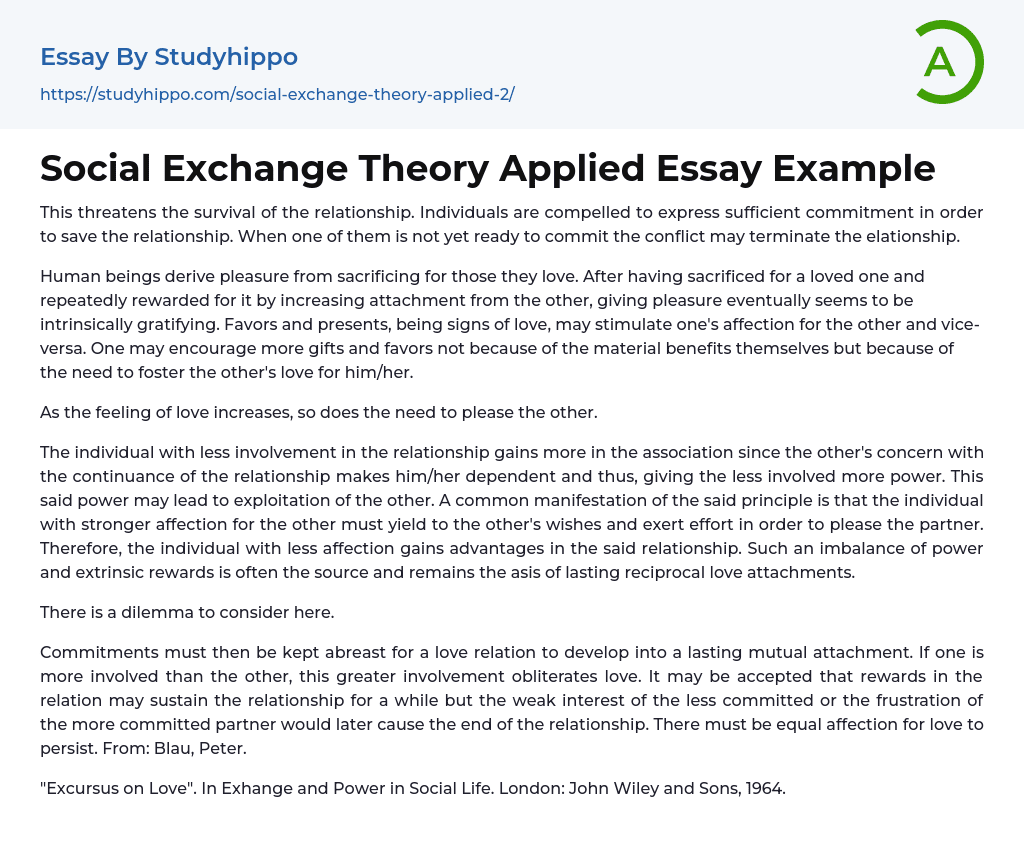This threatens the survival of the relationship. Individuals are compelled to express sufficient commitment in order to save the relationship. When one of them is not yet ready to commit the conflict may terminate the elationship.
Human beings derive pleasure from sacrificing for those they love. After having sacrificed for a loved one and repeatedly rewarded for it by increasing attachment from the other, giving pleasure eventually seems to be intrinsically gratifying. Favors and presents, being signs of love, may stimulate one's affection for the other and vice-versa. One may encourage more gifts and favors not because of the material benefits themselves but because of the need to foster the other's love for him/her.
As the feeling of love increases, so does the need to please the other.
The individual with less involvement in
...the relationship gains more in the association since the other's concern with the continuance of the relationship makes him/her dependent and thus, giving the less involved more power. This said power may lead to exploitation of the other. A common manifestation of the said principle is that the individual with stronger affection for the other must yield to the other's wishes and exert effort in order to please the partner. Therefore, the individual with less affection gains advantages in the said relationship. Such an imbalance of power and extrinsic rewards is often the source and remains the asis of lasting reciprocal love attachments.
There is a dilemma to consider here.
Commitments must then be kept abreast for a love relation to develop into a lasting mutual attachment. If one is more involved than the other, this greater involvement obliterates love
It may be accepted that rewards in the relation may sustain the relationship for a while but the weak interest of the less committed or the frustration of the more committed partner would later cause the end of the relationship. There must be equal affection for love to persist. From: Blau, Peter.
"Excursus on Love". In Exhange and Power in Social Life. London: John Wiley and Sons, 1964.
- Values of Life essays
- Ethical dilemma essays
- Normative Ethics essays
- Virtue Ethics essays
- Belief essays
- Deontology essays
- Moral essays
- Virtue essays
- Work Ethic essays
- Adaptation essays
- Adventure essays
- Adversity essays
- Aging essays
- Alcohol essays
- Barbie Doll essays
- Beauty essays
- Care essays
- Carpe diem essays
- Change essays
- Chess essays
- Chicken essays
- Choices essays
- Contrast essays
- Crops essays
- Development essays
- Dream essays
- Evil essays
- Experience essays
- Family essays
- Farm essays
- Fire essays
- First Love essays
- Focus essays
- Greed essays
- Hero essays
- Holiday essays
- House essays
- Housing essays
- Humility essays
- Humor essays
- Hypocrisy essays
- Integrity essays
- Law of Life essays
- Life Changing Experience essays
- Life Experience essays
- Lifestyle essays
- Limitations essays
- Love Story essays
- Mother Tongue essays
- Motherhood essays




